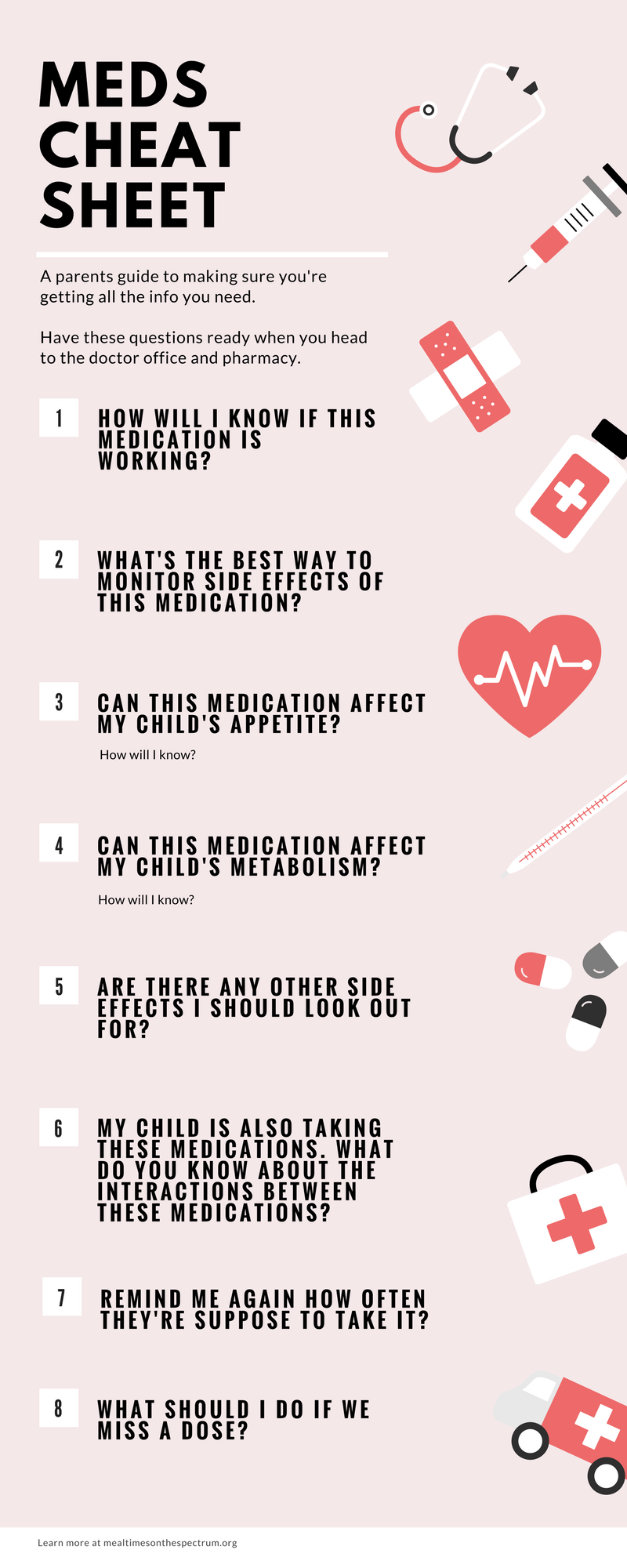Understand the influence of medications
Many parents receive little or no information on the side effects of medication. It turns out that many medications commonly prescribed to children with autism have effects on appetite and metabolism. Sometimes challenging behavior related to eating or mealtimes could be related to a child's medication. It can be hard to figure out what's a medical side effect and what's behavioral.
“When she was on a stimulant, it was an appetite depressant. She was not hungry. And so there was a lot of, ‘you need to eat four more bites.’ So it was a lot more controlling because cause she really wasn’t hungry. Now she eats like a champ. I don’t know if she’s on something that stimulates her appetite or not but she’s really changed. ”
Children are prescribed a wide variety of medications and Mealtimes on the Spectrum does not offer medical advice. But we know that doctor visits are often rushed so here are some questions that you can ask your doctor and pharmacist to help make sure you're getting all the information you need to understand your child's medication:
1. HOW WILL I KNOW IF THIS MEDICATION IS WORKING? 2. WHAT'S THE BEST TO MONITOR SIDE EFFECTS OF THIS MEDICATION? 3. CAN THIS MEDICATION AFFECT MY CHILD'S APPETITE? and how will I know? 4. CAN THIS MEDICATION AFFECT MY CHILD'S METABOLISM? and how will I know? 5. ARE THERE ANY OTHER SIDE EFFECTS I SHOULD LOOK OUT FOR? 6. MY CHILD IS ALSO TAKING THESE MEDICATIONS. WHAT DO YOU KNOW ABOUT THE INTERACTIONS BETWEEN THESE MEDICATIONS? 7. REMIND ME AGAIN HOW OFTEN THEY'RE SUPPOSE TO TAKE IT? 8. WHAT SHOULD I DO IF WE MISS A DOSE?
Medications can affect diet in several ways. They can make children less hungry by reducing their appetite. As you can imagine, this can have a huge effect on their hunger profile and their mealtime behavior. If your child has a decreased appetite due to their medication, you can have it written into their 504 plan or IEP that they have snacks throughout the day, increased time at lunch, or a specialized lunch environment if any or all of these things will keep them at a healthy weight. On the other hand, some medications can make children much hungrier or make them metabolize food differently. This can even cause excessive weight gain. Other medications can cause nutrient deficiencies. Some side-effects may be well worth the positive effects of the medication. This is a conversation to have with your doctor- it's just that without knowing how the medication affects appetite it can be easy to think it's all a behavioral issue.
“His medication was a huge one for weight gain. He gained like 80 pounds and they finally had to- even though the medicine was working- they had to take him off and put him on something else.”
References
All content is original to Mealtimes on the Spectrum, but is based on the following scientific literature:
Basu, T. K., & Donaldson, D. (2003). Intestinal absorption in health and disease: micronutrients. Best Practice & Research Clinical Gastroenterology, 17(6), 957-979. doi: 10.1016/S1521-6918(03)00084-2
Deng, C. (2013). Effects of antipsychotic medications on appetite, weight, and insulin resistance. Endocrinology and Metabolism Clinics, 42(3), 545-563. doi: 10.1016/j.ecl.2013.05.006
Sergeant, J. (2013). Practitioner review: current best practice in the management of adverse events during treatment with ADHD medications in children and adolescents. Journal of Child Psychology and Psychiatry, 54(3), 227-246. doi: 10.1111/jcpp.12036


